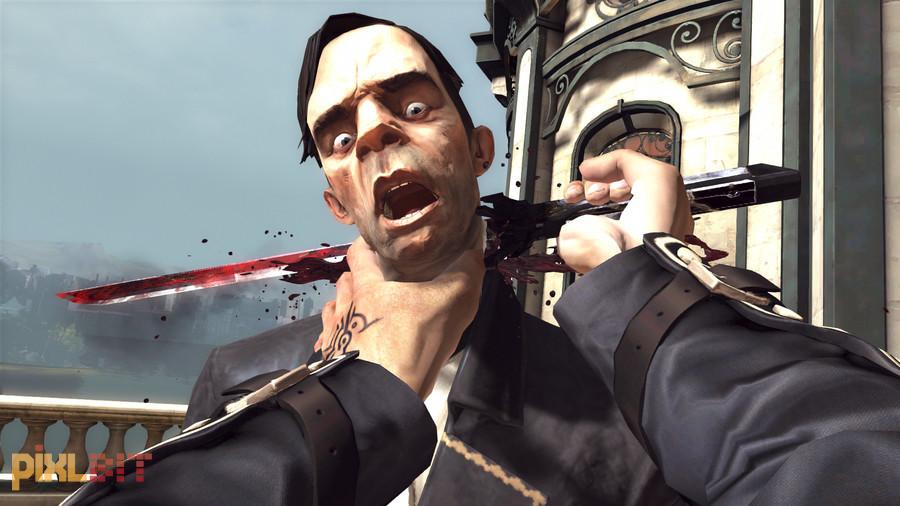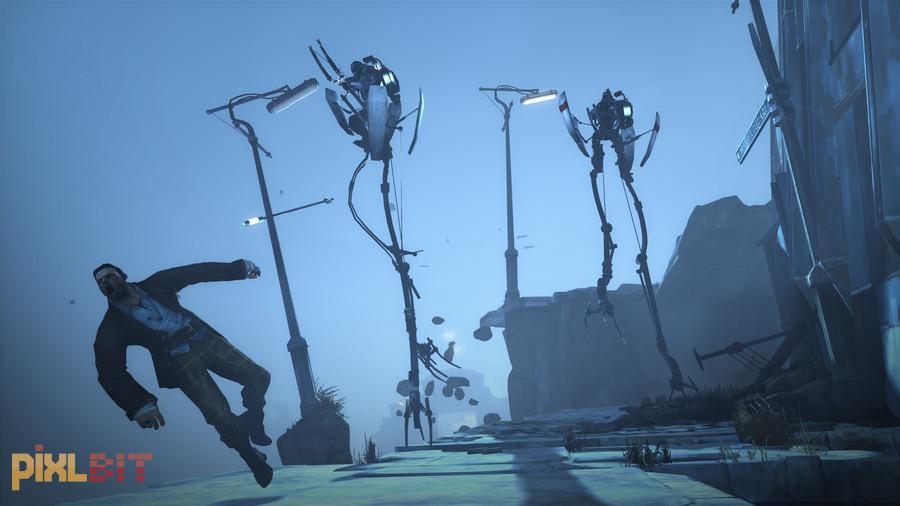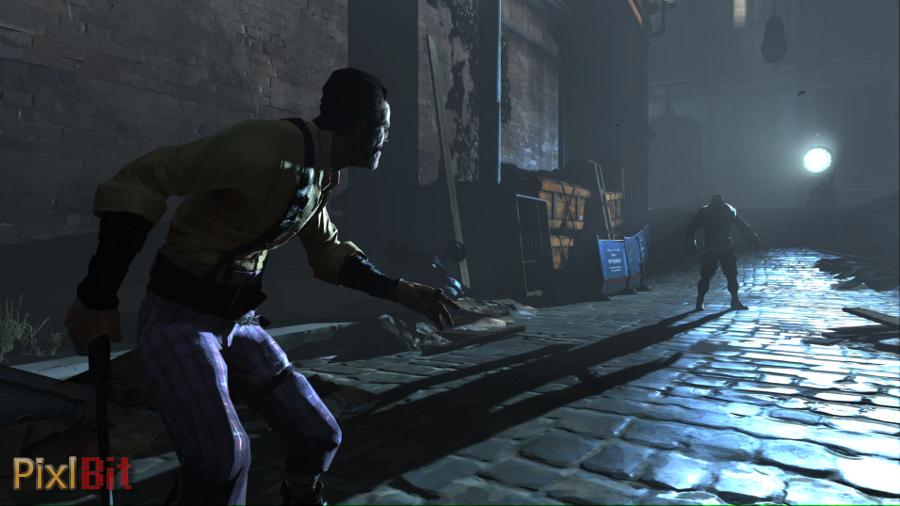
Something is telling me that I need to unleash my inner cynic and find ways to trash and nitpick Dishonored after it received so much hype. I tried my best to find things that were poorly done or off-putting. All that effort was a waste because everything I found wrong with the game was so minor and unimportant that it made realize that I don’t think I’d change a single thing. Dishonored is one of the rare instances where all of the pre-release excitement and anticipation is completely justified and I’m happy to get to pour on additional praise.
If you somehow missed out on everything leading up to Dishonored’s release, it’s a first-person action game set in a dystopian steam-punk-esque realm where you can complete missions using stealth, mystical powers, brute violence, trickery, or a combination of all of those. The story opens with your character, Corvo, being present when the Empress is murdered and getting wrongly accused of doing the deed. Your first mission is to escape imprisonment and join up with a group of loyalists who will guide you on the rest of your missions through the game to rescue the Empress’s daughter and try to save the plague-ridden empire.

Escaping prison acts as a training session for sneaking about and using both melee and long-range combat. You get your first taste of the game’s mechanics and get hit with some pretty blatant wake up calls that this is in fact a game and not an assassin sim. Guards have squiggly lines that appear over their heads when you arouse their suspicions, your next waypoint has a floating arrow pointing at it, and hints and tips are flashing all over the screen. Go turn most of that crap off! Luckily, even if you leave all of those visual aids turned on, Dishonored doesn’t force every player to endure hours-long tutorials to teach you how to play, but dumps you right into this first objective and flashes quick instructions on the screen until you know the ropes. By turning off some portion of those on-screen doodads, you still won’t feel like a real assassin but you will feel more in touch with other elegant visual cues onscreen about your character’s status and where to go next. This is the first brilliant bit of game design – customization of your experience.
During your prison escape when you inevitably botch sneaking around, you’ll find yourself embroiled in some of the most sensory-pounding combat ever. Swings of your sword are deliberate and weighty, as are blocks put up by well-trained guards and cultists. Each strike is paired with such finely tuned rumbling from the controller that locking swords with an opponent feels substantial, but is even more impactful when you feel it in your gut as you land a fatal blow. You can tell a lot of care was put into making the melee combat feel about as real as possible in a game, but that’s not just true for the close-quarters combat. The ranged weapons operate about as well as any top tier FPS out there - if more of them used incendiary crossbows bolts, that is.
After you make your way out of prison, you have your first encounter with The Outsider who grants you your first of many mystical powers. You can unlock and upgrade additional powers as the game progresses based on how many runes you find hidden in the environment. Finding runes and other useful items called bone charms is aided by another gift from The Outsider – a mechanical heart that is likely to creep you right the hell out. Equip the heart on any level and it will start to thump, thump, thump when you are pointed towards a hidden rune or charm, but the heart has another capability too: speech. Equipping the heart and pulling the trigger will make the heart reveal - in its eerie female voice - ancient tales of your current locale and nearby citizens. It is one of the many ways that the game injects environment-based narrative into every possible crevice of the world.

Listening to the heart’s stories and discovering notes, books, audio recordings, and graffiti was a big part of what got me completely hooked on the game. Finding the diary of a fundamentalist driven mad by coveting a bone charm and eavesdropping on a squabbling couple through a keyhole kept me on the lookout for more fascinating vignettes hidden everywhere. It’s similar to the type of one-off story discoveries you encounter in Skyrim, but there’s a chance you could actually get the details on every tableau in Dishonored since the world isn’t enormous, but is certainly packed with content.
Those who love games like Skyrim will find another similarity to enjoy here – the upgrades you choose to unlock are essentially an RPG skill tree. If you obsessively hunt down every rune in the game, by the end you’ll have all the notable powers available, but which ones you choose to unlock as you go could vary greatly. The first power granted to you, “blink,” helps you stealthily and nimbly traverse the environments. You can instantly flash your way from cover-to-cover (within range), or up to a building’s exposed pipes, or a balcony railing, or most anything. But that’s just the default first power. You’re also able to unlock the ability to possess animals and people, to summon swarms of devouring rats, to see through walls, to summon gusts of wind, and to turn victims to ash instantly. These powers, along with the more traditional tools of violence give you plenty of options with which to devise schemes to complete your missions and eliminate targets.
I assume that I approached the game like many people – trying my best to be stealthy and then resort to violence when I eventually got spotted. Sneaking from blockade to train car to right behind a city watch guard in order to render them unconscious was a thrill every time. If you foul it up, all of the other guards within earshot are headed your way. The chunky combat I adore comes right at you in mobs of attackers that can make it dicey to fight your way out.

Getting discovered is a bit less gamey than it has been in many other stealth games. Yes, people stop looking for you much more quickly than is realistic if you should run off and hide, but the AI does many other smart things that increase the challenge in some fairly realistic ways. Guards will notice if a patrol is suddenly left unattended and do a few rounds there themselves. This will often lead them to discover a tidy little pile of bodies (dead or unconscious – you choose) that you left under a desk in an office and put the whole sector on alert. This can make long stake outs even more intense as you’ve almost cleared a nice tidy path to an objective and Mr. Busybody Guard sticks his nose where it shouldn’t be to make your life more difficult. In my game, this is when Mr. Busybody Guard gets hit with the rats. Sure, he might have help run over when he starts to scream in terror, but those bullets his pals are shooting at the rats often kill Mr. Busybody Guard too. It’s quite a sight to see, really, but you’ve got to pull away and leap to the next rooftop to keep going while everyone is busy.
Even though I resorted to that plan of action several times, I also had success with so many other methods of sneaking about (possessing a rat for instance) and taking out hostiles that there is no way to mention all of the possible tactics here. Yes, at times you can see that the devs plotted out routes specifically to allow for stealthy methods, but there are often multiple ways to use each set of techniques in each area. Many times, I would enter a building via one route and then find my way back in a completely different manner, even though I could have just backtracked. Part of this discovery of the countless possibilities was in no doubt thanks to my need to find all of those precious runes and bone charms, but also to find more little details about the people inhabiting this world.
As the story advances, it becomes apparent that it isn’t some amazing groundbreaking tale, but I think the side stories and environmental vignettes are what make the game’s narrative special anyway. Some of the side quests and ways in which you resolve the main quests have impact on future missions – one more instance of choice being a big part of Dishonored. The voice actors for the major characters do a pretty great job (big props to Susan Sarandon playing Granny Rags). But man, the average guard’s lines are pretty awful. You’ll hear the same few (awkwardly read) lines many times, with questions and generic responses mixed around to make things sound different. It’s surprising that people that you listen to so often during the game weren’t given more lines with a bit more substance.

Other than their lines, some of those common guards or fundamentalist creepers do some dumb things occasionally. Even though they’ll often squat down to search under tables where you might be hiding, there were some spots that they just wouldn’t look under even though I continuously slashed at leg after leg that kept approaching me in a mob until they were all leg-murdered. This sort of goofy logic is extremely rare, but it does happen in a few select cases. There were a few times when I felt ripped off because people were on high alert even though I thought I had covered my tracks pretty well and hadn’t noticed anyone finding my corpse stashes. Upon further reflection, I think this makes things even more realistic since a real sneaky guy wouldn’t know when he had been found out a couple of streets over. That sort of thinking is what happened with almost every other “bad” part of Dishonored I could come up with. I was able to talk myself right out of it – possibly because I am completely smitten.
I’m deeply sorry if you are looking for someone to trash Dishonored and didn’t get your fix from me. I really did try my best to find problems, but I just couldn’t find anything significant to complain about. I haven’t been as drawn in and absorbed in a game from start to finish in years as I am with Dishonored. Yes, I’m still hooked even though I’ve finished it. I’ve got to try and be a complete “ghost” a few times, and find a few more routes through cities, and try to blend in a little better at the masquerade party, and… you get the idea. I gotta go; Dishonored is waiting for me.















Comments